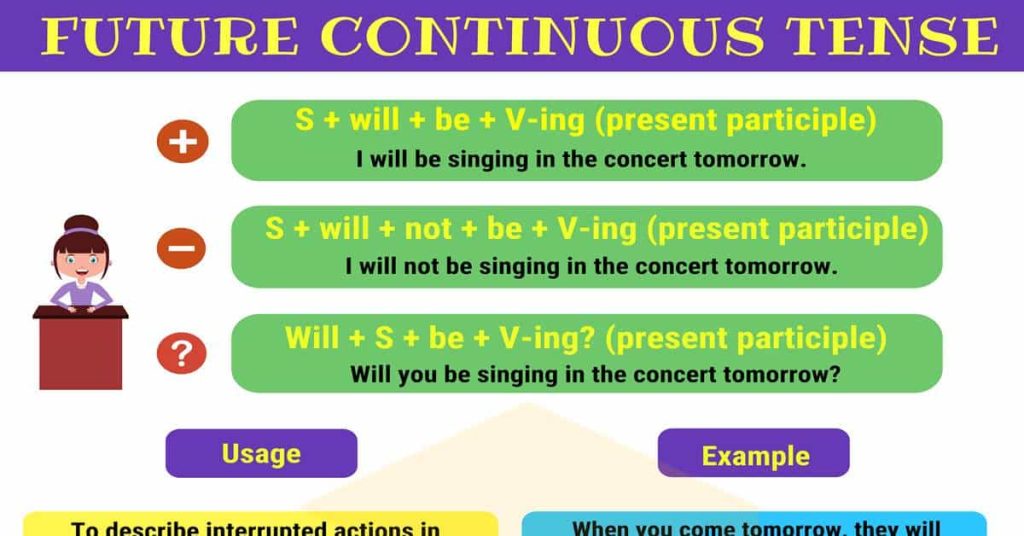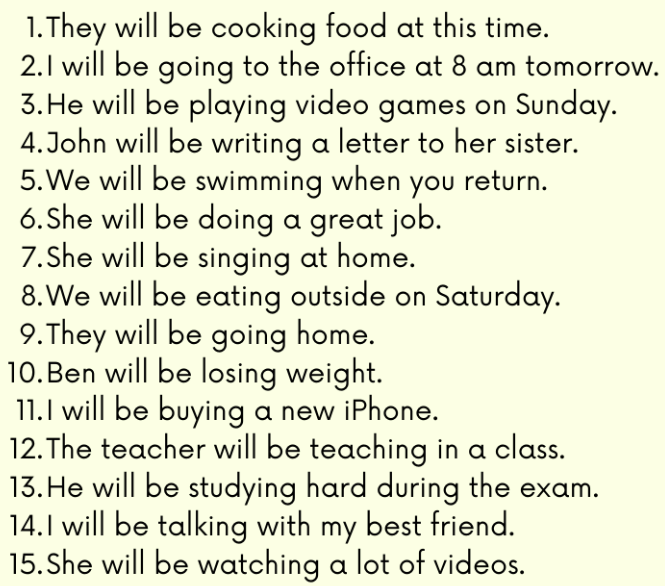Future Continuous Tense: A Catalyst for IELTS Language Proficiency
Mastering grammatical tenses is a vital aspect of excelling in language proficiency exams, and the future continuous tense stands as a significant component in the spectrum of English grammar. The future continuous tense, formed by combining ‘will’ or ‘shall’ with ‘be’ and the base verb form plus ‘ing’, allows for the expression of ongoing actions at a specific point in the future. This grammatical structure plays a crucial role in the IELTS examination, influencing language complexity, coherence, and range.
In this article, we delve into the intricacies of the future continuous tense and its impact on IELTS, highlighting its relevance and how its accurate application can elevate a candidate’s performance.

1. What is the future continuous tense?
The future continuous tense is a grammatical tense used to describe ongoing or continuous actions that will happen at a specific point in the future. It indicates an action that will be in progress at a particular future time and often emphasizes the duration or continuity of the action. This tense is also referred to as the future progressive tense.
2. What is the form of future continuous tense?
The future continuous tense is formed using the future tense of the verb “to be” (will be or shall be) and the base form of the main verb + ing (present participle).
Affirmative:
- Subject + will be/shall be + base form of the verb + ing (present participle)
Negative:
- Subject + will not (won’t) be + base form of the verb + ing (present participle)
Interrogative:
- Will + subject + be + base form of the verb + ing (present participle)
Examples:
Affirmative:
- They will be studying for the exam.
- She will be running a marathon tomorrow.
Negative:
- I will not (won’t) be attending the meeting.
- He will not (won’t) be working on the project.
Interrogative:
- Will you be traveling to Paris next month?
- Will they be joining us for dinner?

3. What is the usage of future continuous tense?
The future continuous tense is used to describe ongoing or continuous actions that will happen at a specific point in the future. This tense emphasizes the idea that the action will be in progress at a particular time in the future. Here are the primary usages of the future continuous tense:
3.1. Expressing Future Actions in Progress
The future continuous tense is used to describe actions that will be ongoing or in progress at a specific future time.
- At 5 PM tomorrow, I will be studying for my exam.
3.2. Predicting Future Events
It can be used to make predictions or assumptions about ongoing actions that will likely happen in the future.
- I think they’ll be playing soccer when we arrive.
3.3. Talking About Future Plans
It is used to discuss future plans, especially emphasizing the continuous or ongoing nature of the action.
- Tomorrow evening, she’ll be attending a conference.
3.4. Polite Future Requests
The future continuous tense can be used to make polite requests about future actions.
- Will you be helping me with the presentation later today?
3.3. Conveying Future Interruptions
It can describe actions that will be ongoing but might be interrupted by another action in the future.
- At 8 PM, I’ll be cooking dinner when they arrive.
3.4. Narrating Future Events in Progress
The future continuous tense is used in storytelling to describe actions that will be in progress at specific moments in the future.
- At the stroke of midnight, we’ll be toasting to the New Year.
3.5. Expressing Assumptions About the Future
It can be used to express assumptions or guesses about ongoing actions in the future.
- He’ll probably be studying all night for the upcoming exam.
>> Suggested article: the future continuous tense
4. How does the future continuous tense impact on the IELTS test?
The future continuous tense, a fundamental grammatical structure in English, plays a notable role in the IELTS examination. It significantly impacts a candidate’s language performance, particularly in the grammar for IELTS speaking and writing sections. Here’s how the future continuous tense affects the IELTS test:
4.1. Demonstrates Grammatical Range
Accurate use of the future continuous tense showcases a wide range of grammatical structures, which is a key criterion for a higher band score in the IELTS test. It demonstrates a candidate’s ability to manipulate different tenses, indicating a strong command of the English language.
4.2. Enhances Language Complexity
The future continuous tense adds complexity to a candidate’s language use. Employing this tense correctly and appropriately implies a higher level of language proficiency, leading to an enhanced performance and potentially a higher score in the test.
4.3. Expresses Future Plans and Predictions
In both the IELTS speaking and IELTS writing sections, candidates are often asked about their future plans, intentions, or predictions. Utilizing the future continuous tense allows for precise communication of ongoing or continuous actions at a specific future time, enhancing the depth and clarity of responses.
4.4. Improves Coherence and Cohesion
Proper application of the future continuous tense contributes to well-structured responses, especially in the writing section. It helps in presenting ideas and future actions in a clear, organized manner, improving coherence and cohesion, which are crucial assessment criteria.
4.5. Shows Accuracy and Language Precision
Using the future continuous tense accurately reflects grammatical precision and language accuracy. It indicates a candidate’s ability to convey ongoing future actions in a grammatically correct and precise manner, aligning with the IELTS assessment criteria.
4.6. Adds Nuance to Future Scenarios
The future continuous tense allows candidates to add nuance to their language by describing ongoing or anticipated actions at specific future times. This nuance enhances the depth and sophistication of their responses, impacting their overall language performance.

5. Exercises of the future continuous tense
Exercise 1: Rewrite the sentences using the future continuous tense.
They will read a book.
- Answer: They will be reading a book.
She will write an essay.
- Answer: She will be writing an essay.
Exercise 2:Create sentences using the future continuous tense. Choose the correct verb and form it accordingly.
We / have dinner
- Answer: We will be having dinner.
He / work on the project
- Answer: He will be working on the project.
Exercise 3: Form negative sentences using the future continuous tense.
I will be studying all night.
- Answer: I will not be studying all night.
They will be playing football in the afternoon.
- Answer: They will not be playing football in the afternoon.
Exercise 4: Ask questions using the future continuous tense.
You / cook dinner
- Answer: Will you be cooking dinner?
She / practice the piano
- Answer: Will she be practicing the piano?
Exercise 5: Complete the sentences using the future continuous tense.
By 8 PM tomorrow, they __________ (have) dinner.
- Answer: By 8 PM tomorrow, they will be having dinner.
At this time next week, I __________ (attend) a conference.
- Answer: At this time next week, I will be attending a conference.
The future continuous tense, with its capability to portray ongoing actions at future junctures, significantly contributes to a candidate’s language proficiency and coherence in the IELTS examination. Its apt usage enhances grammatical range and complexity, showcasing a candidate’s advanced understanding of the English language. Being able to wield the future continuous tense effectively in both spoken and written responses positively influences a candidate’s overall IELTS score. Hence, mastering the nuances of this tense is an invaluable asset for any IELTS aspirant aiming to achieve a higher band score and ultimately, language success. It’s time to take the IELTS online test to achieve your band score.